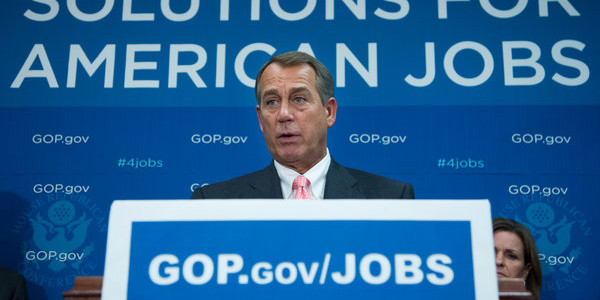Manuel Balce Ceneta/Associated Press Speaker John A. Boehner failed to draw enough Republican support for a bill last month. By RON NIXON Published: July 2, 2013 WASHINGTON — The startling failure of the farm bill last month reflects the declining clout of the farm lobby and the once-powerful committees that have jurisdiction over agriculture policy, economists and political scientists said this week. Although a number of factors contributed to the defeat of the bill — including Speaker John A. Boehner’s failure to rally enough Republican support and Democratic opposition to $20 billion in cuts to the food stamps program — analysts said the 234 to 195 vote also illustrated the shift in the American population and political power to more urban areas. “There are a small number of Congressional districts where farming continues to carry much sway,” said Vincent H. Smith, a professor of agricultural economics at Montana State University. “Especially in the House, the farm lobby has been substantially weakened.” For much of American history, the agriculture sectors wielded tremendous political power. Farm groups were able to get key farm legislation passed by rallying millions of farmers in nearly every Congressional district. Influential farm state legislators like Representative Jamie L. Whitten of Mississippi, a Democrat who was chairman of the Appropriations Committee and its subcommittee on agriculture, brought billions in agriculture financing to their states and fought off attempts to cut subsidy programs despite pressure from both liberals and conservatives. Mr. Whitten died in 1995 after 53 years in Congress. But as Americans have moved to the cities and suburbs, farmers and lawmakers representing districts largely dependent on agriculture have seen their political muscle steadily decline. Just 2.2 million people now work in farming in the United States, or about 2.5 percent of the total work force. Farming now accounts for about 1 percent of gross national product, down from a high of about 9 percent in 1950. Only 40 lawmakers represent largely farming districts, according to research by Mr. Smith in 2006. He said that number was probably smaller today. Nonetheless, agriculture groups said they continue to have influence and blamed increased partisanship for the inability of Congress to pass the farm bill. “Agriculture used to be a nonpartisan issue that both Democrats and Republicans could support,” said Danny Murphy, president of the American Soybean Association. “Now people are lining up to take sides; it’s nutrition or farm programs,” he said. “For us, it’s a nonissue. We’re farmers, how can we be against food?” Barry L. Bequette, dean of the School of Agriculture, Research, Extension and Applied Sciences at Alcorn State University in Lorman, Miss., said the issue was not a lack of power. “Farmers just haven’t learned how to utilize the power they have,” he said. “All the groups are fractured and focused on their own narrow issues.” But agricultural economists like Mr. Smith said the Congressional response to last year’s drought and this year’s debt talks provide more evidence of the waning political influence of agriculture. Last summer, as the worst dry spell in 50 years was causing widespread damage to farmland and livestock, national farm organizations pushed for the passage of a farm bill that would provide relief. But the groups were unable to muster enough support to even get the bill to the floor for a vote. Representative Frank D. Lucas, Republican of Oklahoma and chairman of the House Agriculture Committee, which did pass a farm bill , made several appeals to House leaders to bring the legislation up for a vote, but they declined. When the Obama administration and Republican leaders worked out a compromise to avert automatic tax increases in January, Mr. Lucas and Senator Debbie Stabenow, the Michigan Democrat who is chairwoman of the Senate Agriculture Committee, tried desperately to get the farm bill included in the talks. Both touted the savings they had achieved in both the House and Senate version of the bills. But their pleas were largely unheeded. The Senate instead chose to include in the tax package a slimmed-down farm bill proposal by Senator Mitch McConnell of Kentucky, the Republican minority leader. Mr. McConnell’s proposal extended only portions of the current farm bill, which was passed in 2008. The extension did not provide disaster assistance for livestock owners, who had to kill thousands of cows, pigs and chickens because of rising feed prices and lack of water. It eliminated money for conservation programs and financing for fruit and vegetable growers and organic farmers, and cut a program that pays milk producers when feed prices increase. The proposal did contain provisions to prevent milk prices from rising and left in place direct payments to farmers or farmland owners, whether or not they grow crops. The payments, which total about $5 billion a year, have long been criticized as examples of wasteful government spending. The bill passed the Senate by 89 to 8, with a reluctant Ms. Stabenow voting for it; it passed the House by 257 to 167. Mr. Lucas also voted for the House bill. Farm groups said they felt equally ignored. An exasperated Ms. Stabenow summed up the feeling of both farm state lawmakers and the farm sector in an interview shortly after the deal was announced. “There is absolutely no way to explain this other than agriculture is just not a priority,” she said. Collin C. Peterson, the Minnesota Democrat and ranking member on the House Agriculture Committee, sent a letter to House leaders involved in the debt talks. “I could not believe that you and your leadership team could treat the committee with such disrespect,” he wrote. Taylor Scott International
Farm Bill Defeat Shows Agriculture’s Waning Power

This entry was posted in Investment, investments, News, Property, Shows, Taylor Scott International, TSI, Uk and tagged calendar, cities, congress, debt, democrats, food, investment, michigan, political, power, shows. Bookmark the permalink.







